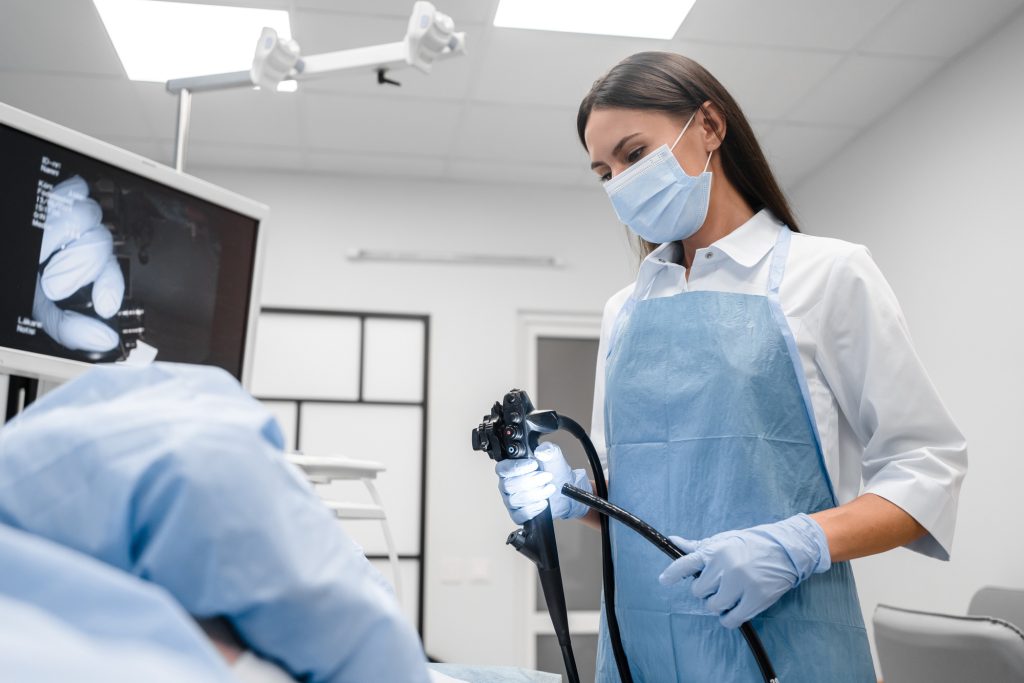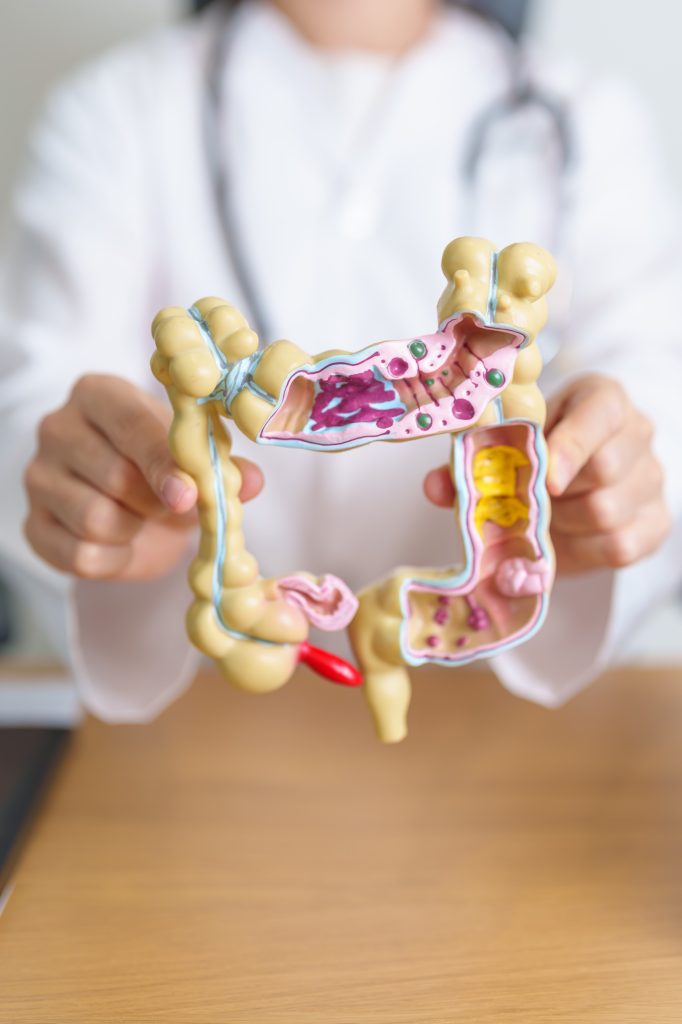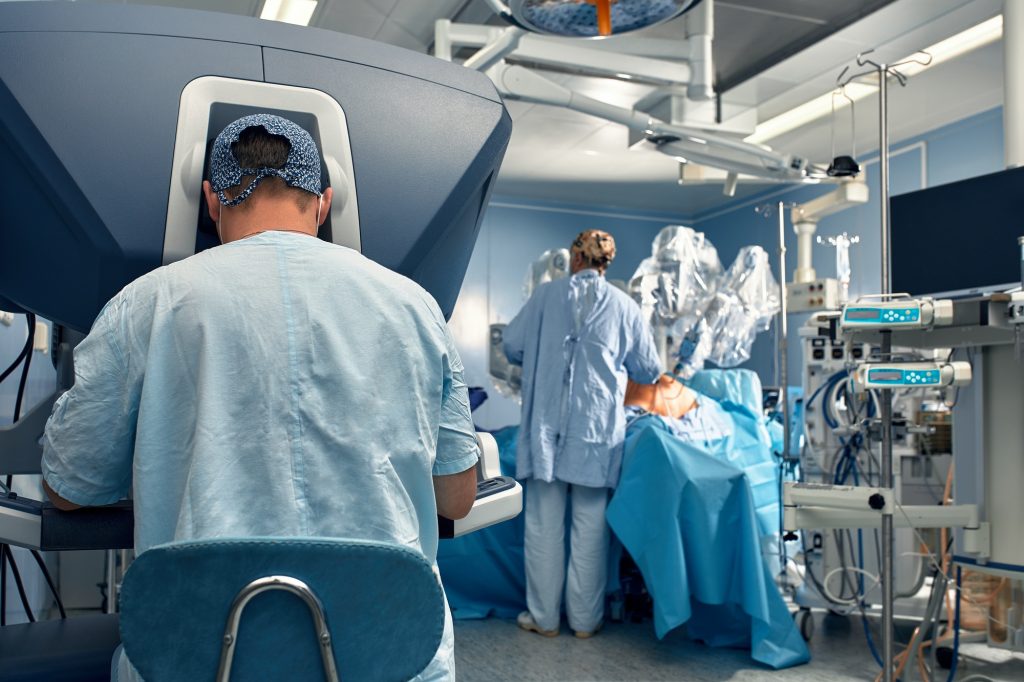Symptoms of Diverticula and Diverticulitis
Diverticulosis (presence of diverticula without inflammation)
- Generally asymptomatic.
- In some cases, it may cause mild digestive discomfort such as bloating, gas, or changes in bowel habits.
Diverticulitis (inflammation or infection of the diverticula)
- Severe abdominal pain, usually in the lower left side of the abdomen.
- Fever and chills, indicating infection.
- Changes in bowel habits, including diarrhea, constipation, or alternating between both.
- Nausea and vomiting, due to severe inflammation.
- Rectal bleeding in advanced cases, which can be mild or heavy.
- Abdominal tenderness or swelling, possibly with hardening in the affected area.
If left untreated, diverticulitis can lead to complications such as abscesses, intestinal perforation, fistulas, or peritonitis, requiring emergency surgery.
Diagnosis of Diverticula
At Centro Pad, we use advanced technology to diagnose diverticulosis and diverticulitis:
- Colonoscopy, which allows us to visualize the diverticula and rule out other colon diseases.
- Computed Tomography (CT) scan, recommended in acute diverticulitis cases to assess the extent of the issue and possible complications.
- Blood tests, to identify signs of infection, inflammation, or anemia caused by digestive bleeding.
- Stool tests, to rule out intestinal infections that might mimic diverticulitis.
An accurate diagnosis allows us to define the best treatment for each patient and prevent major complications.
Advanced Treatments for Diverticula in Moncloa-Aravaca
Treatment depends on the severity of the condition. In mild cases, a high-fiber diet, antibiotics, and bowel rest are recommended. However, in more advanced or recurrent cases, surgery is the best option.

Robotic Surgery with the Da Vinci System
Robotic surgery is one of the most advanced techniques for treating complicated diverticulitis. This procedure incorporates all the benefits of laparoscopic surgery—such as minimal invasion and fast recovery—while adding additional advantages thanks to the precision and advanced technology of the Da Vinci system. Its benefits include:
- Greater precision and less damage to surrounding tissues, reducing surgical trauma.
- Less postoperative pain and reduced need for painkillers, leading to a more comfortable recovery.
- Faster recovery and shorter hospital stays, allowing patients to return to daily life sooner.
- Lower risk of complications and recurrence, ensuring better long-term outcomes.
- Smaller scars and better aesthetic results compared to traditional open surgery.
Robotic surgery with the Da Vinci system is considered the most innovative alternative, combining the advantages of laparoscopy with superior precision and greater safety for the patient.
Laparoscopic Surgery for Diverticulitis
Another effective option is laparoscopic surgery, which removes the affected part of the colon through small incisions. Its advantages include:
- Less postoperative pain compared to open surgery.
- Faster recovery and lower risk of infections or complications.
- Better aesthetic results, with minimal scarring and less impact on quality of life.
- Reduced time off work, enabling earlier return to normal activities.
Other Minimally Invasive Techniques
- Image-guided abscess drainage, used in cases of diverticulitis with localized infection, helping avoid immediate surgery.
- Stent placement in specific cases, to prevent intestinal obstruction in patients with recurring episodes.
When Is Surgery for Diverticulitis Necessary?
Surgery is recommended in the following cases:
- Repeated episodes of diverticulitis that affect the patient’s quality of life and well-being.
- Serious complications such as colon perforation, abscesses, intestinal fistulas, or peritonitis.
- Severe bleeding that cannot be controlled with conventional treatment and may lead to anemia.
- Intestinal obstruction that prevents proper food transit and causes severe abdominal pain.
- Lack of response to medical treatments, increasing the risk of future complications.
At Centro Pad in Moncloa-Aravaca, we carry out a personalized evaluation to determine the best surgical option for each case.



